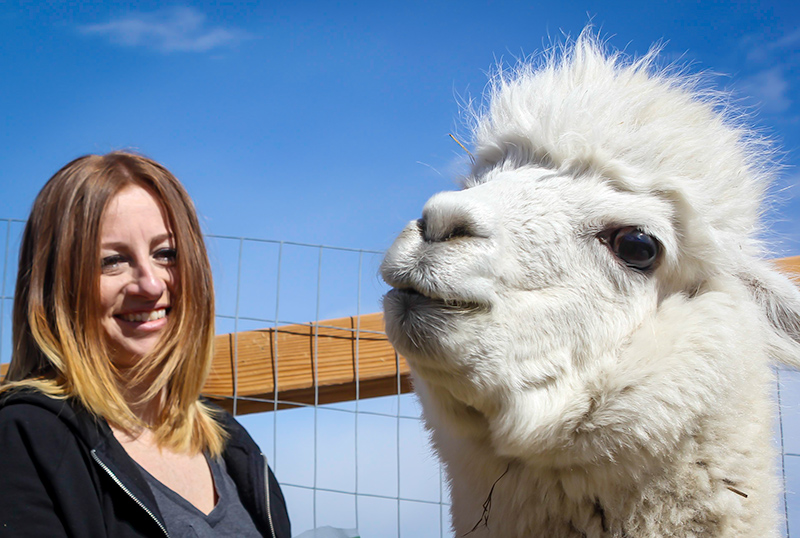Hot alpaca adventures package and vacation recommendations in Colorado

Colorado alpaca adventure tours from meetalpacas.com: Kids will love visiting an alpaca farm because the animals are so friendly and docile. They can pet the animals, feed them, and even help with shearing and halter training. Getting kids involved in the farm experience will teach them responsibility and instill a lifelong appreciation for the land that supports their families. Not to mention, the physical activity required for herding and feeding alpacas offers countless health benefits. This type of exercise promotes cardiovascular health and builds muscle strength. It is also an excellent stress-reducer, as the alpacas’ gentle touch and soothing sounds can have a calming effect on both humans and children. Discover more information on where to see alpacas in Colorado.
You can walk with an alpaca on your own or participate in guided tours and vineyard retreats, ranch stays, and farm dinners. The farm walks are often over rocky, sometimes muddy, and wooded terrain, so hiking boots or tennis shoes are recommended. It’s important to spread out as alpacas can kick if they feel threatened or are startled. If you’re a nature lover, there’s plenty of time to explore the scenic property’s rolling hills, forests, vineyards, and ponds. A picnic lunch is available for guests at the onsite restaurant, or you can bring your own to enjoy in a designated area.
Get ready for an Alpaca Adventure ! A Wildly Immersive and Hilarious Alpaca Adventure Perfect For All Ages : Embark upon an unforgettable magical experience with affectionate Alpacas, and explore the scenic mountain views of Red Rocks Park. We offer truly unique experiences that gets you up-close with these majestic friends. You’ll be entertained and educated on their habits, diets, and life on the ranch as you discover what makes these creatures so special.
Alpacas breed once a year, and as livestock they are often induced to breed at any time. The female alpaca has a gestation period of 242 to 345 days and gives birth to just one offspring. The birthing process can take up to seven hours, according to National Geographic (opens in new tab). The baby alpaca, called a cria, weighs 18 to 20 lbs. (8 to 9 kg) when it is born. The cria is weaned at 6 to 8 months, and females are ready to reproduce at 12 to 15 months. Males take a bit longer to mature and are ready to mate at 30 to 36 months. Alpacas live up to 20 years.
Additionally, if you love seeing and interacting with animals, an alpaca farm provides a hands-on experience. You can hand-feed your new friends a healthy snack and hang out with them while they provide amusing entertainment. It provides you with the chance to interact with the ranch: Most people don’t know a lot about alpacas before they visit the ranch. Alpacas originate from South America, and they’ve been brought to Colorado over the last several decades. The climate of Colorado is perfect for the alpaca, so they’re content living on ranches in Denver. When you go behind the scenes on the ranch, you learn about much more than just the animals. You have the opportunity to talk about the economy, trade, production, local handmade goods, and so much more.
Do alpacas make noise? Alpacas are very quiet, docile animals that make a minimal amount of sound. They do make a humming sound as a means of communication or to express concern or stress. Most communication between alpacas is nonverbal. Occasionally you will hear a shrill “alarm call,” which usually means they have spotted something of concern nearby, and they are warning others in the herd. The concern may be a predator, or may be something they are not familiar with, like a cow or horse in a neighboring field. Male alpacas also “serenade” females during breeding with a guttural, throaty sound called “orgling.” Discover additional details on meetalpacas.com.
Is it OK to have just one alpaca? No. Alpacas have very strong herd instincts and need the companionship of other alpacas to thrive, preferably three or more. Alpacas are livestock, and should not be treated as house pets. Alpacas should be kept with their own sex with a few exceptions. One exception is that male crias need to be kept with their mothers until weaning. Gelded males should not be housed together with females, as they can repeatedly attempt to breed the females. This can lead to serious health consequences for the females.
So what do you DO with these animals? Alpacas are raised for their soft and luxurious fleece (fiber). Each shearing produces roughly five to ten pounds of fleece per animal, per year. This fleece, often compared to cashmere, can be turned into a wide array of products from yarn and apparel to tapestries and blankets. The fleece itself is recognized globally for its fineness, softness, light weight, durability, excellent thermal qualities, and luster.
Alpacas hum; they make a sound like “mmm,” according to Alpaca Ventures. However, they also shriek when danger is present, and make a sound similar to a “wark” noise when excited. Fighting males scream, making a warbling bird-like cry. Alpacas in a herd all use the same area as a bathroom instead of defecating in random areas like many animals do. This behavior helps control parasites, according to the FAO. Males often have cleaner dung piles than females, according to Alpaca Ventures. Females tend to stand in a line and all go at once.
